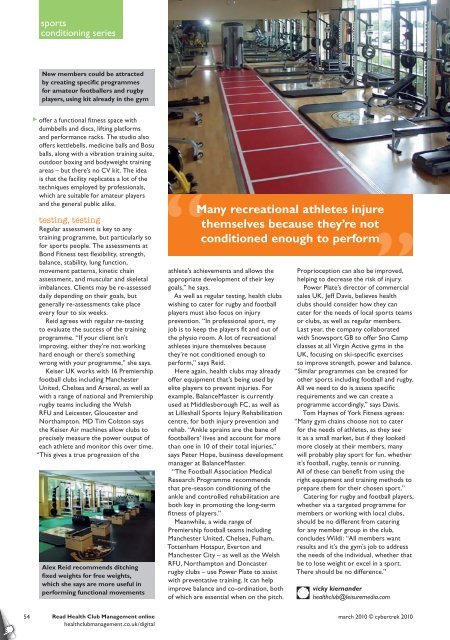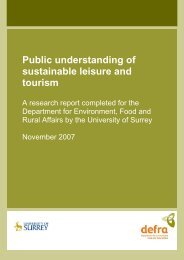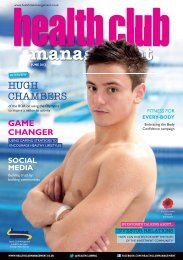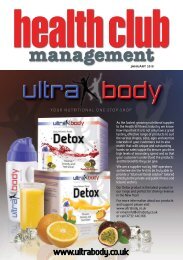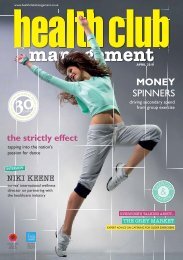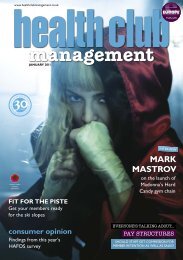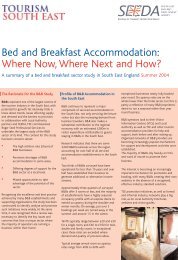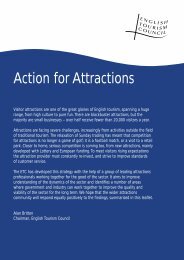Leisure Media HCM March 2010 - TourismInsights
Leisure Media HCM March 2010 - TourismInsights
Leisure Media HCM March 2010 - TourismInsights
You also want an ePaper? Increase the reach of your titles
YUMPU automatically turns print PDFs into web optimized ePapers that Google loves.
sports<br />
conditioning series<br />
New members could be attracted<br />
by creating specific programmes<br />
for amateur footballers and rugby<br />
players, using kit already in the gym<br />
offer a functional fi tness space with<br />
dumbbells and discs, lifting platforms<br />
and performance racks. The studio also<br />
offers kettlebells, medicine balls and Bosu<br />
balls, along with a vibration training suite,<br />
outdoor boxing and bodyweight training<br />
areas – but there’s no CV kit. The idea<br />
is that the facility replicates a lot of the<br />
techniques employed by professionals,<br />
which are suitable for amateur players<br />
and the general public alike.<br />
testing, testing<br />
Regular assessment is key to any<br />
training programme, but particularly so<br />
for sports people. The assessments at<br />
Bond Fitness test flexibility, strength,<br />
balance, stability, lung function,<br />
movement patterns, kinetic chain<br />
assessment, and muscular and skeletal<br />
imbalances. Clients may be re-assessed<br />
daily depending on their goals, but<br />
generally re-assessments take place<br />
every four to six weeks.<br />
Reid agrees with regular re-testing<br />
to evaluate the success of the training<br />
programme. “If your client isn’t<br />
improving, either they’re not working<br />
hard enough or there’s something<br />
wrong with your programme,” she says.<br />
Keiser UK works with 16 Premiership<br />
football clubs including Manchester<br />
United, Chelsea and Arsenal, as well as<br />
with a range of national and Premiership<br />
rugby teams including the Welsh<br />
RFU and Leicester, Gloucester and<br />
Northampton. MD Tim Colston says<br />
the Keiser Air machines allow clubs to<br />
precisely measure the power output of<br />
each athlete and monitor this over time.<br />
“This gives a true progression of the<br />
Alex Reid recommends ditching<br />
fixed weights for free weights,<br />
which she says are more useful in<br />
performing functional movements<br />
Many recreational athletes injure<br />
themselves because they’re not<br />
conditioned enough to perform<br />
athlete’s achievements and allows the<br />
appropriate development of their key<br />
goals,” he says.<br />
As well as regular testing, health clubs<br />
wishing to cater for rugby and football<br />
players must also focus on injury<br />
prevention. “In professional sport, my<br />
job is to keep the players fi t and out of<br />
the physio room. A lot of recreational<br />
athletes injure themselves because<br />
they’re not conditioned enough to<br />
perform,” says Reid.<br />
Here again, health clubs may already<br />
offer equipment that’s being used by<br />
elite players to prevent injuries. For<br />
example, BalanceMaster is currently<br />
used at Middlesborough FC, as well as<br />
at Lilleshall Sports Injury Rehabilitation<br />
centre, for both injury prevention and<br />
rehab. “Ankle sprains are the bane of<br />
footballers’ lives and account for more<br />
than one in 10 of their total injuries,”<br />
says Peter Hope, business development<br />
manager at BalanceMaster.<br />
“The Football Association Medical<br />
Research Programme recommends<br />
that pre-season conditioning of the<br />
ankle and controlled rehabilitation are<br />
both key in promoting the long-term<br />
fi tness of players.”<br />
Meanwhile, a wide range of<br />
Premiership football teams including<br />
Manchester United, Chelsea, Fulham,<br />
Tottenham Hotspur, Everton and<br />
Manchester City – as well as the Welsh<br />
RFU, Northampton and Doncaster<br />
rugby clubs – use Power Plate to assist<br />
with preventative training. It can help<br />
improve balance and co-ordination, both<br />
of which are essential when on the pitch.<br />
Proprioception can also be improved,<br />
helping to decrease the risk of injury.<br />
Power Plate’s director of commercial<br />
sales UK, Jeff Davis, believes health<br />
clubs should consider how they can<br />
cater for the needs of local sports teams<br />
or clubs, as well as regular members.<br />
Last year, the company collaborated<br />
with Snowsport GB to offer Sno Camp<br />
classes at all Virgin Active gyms in the<br />
UK, focusing on ski-specifi c exercises<br />
to improve strength, power and balance.<br />
“Similar programmes can be created for<br />
other sports including football and rugby.<br />
All we need to do is assess specifi c<br />
requirements and we can create a<br />
programme accordingly,” says Davis.<br />
Tom Haynes of York Fitness agrees:<br />
“Many gym chains choose not to cater<br />
for the needs of athletes, as they see<br />
it as a small market, but if they looked<br />
more closely at their members, many<br />
will probably play sport for fun, whether<br />
it’s football, rugby, tennis or running.<br />
All of these can benefi t from using the<br />
right equipment and training methods to<br />
prepare them for their chosen sport.”<br />
Catering for rugby and football players,<br />
whether via a targeted programme for<br />
members or working with local clubs,<br />
should be no different from catering<br />
for any member group in the club,<br />
concludes Wildi: “All members want<br />
results and it’s the gym’s job to address<br />
the needs of the individual, whether that<br />
be to lose weight or excel in a sport.<br />
There should be no difference.”<br />
vicky kiernander<br />
healthclub@leisuremedia.com<br />
54<br />
Read Health Club Management online<br />
healthclubmanagement.co.uk/digital<br />
march <strong>2010</strong> © cybertrek <strong>2010</strong>


